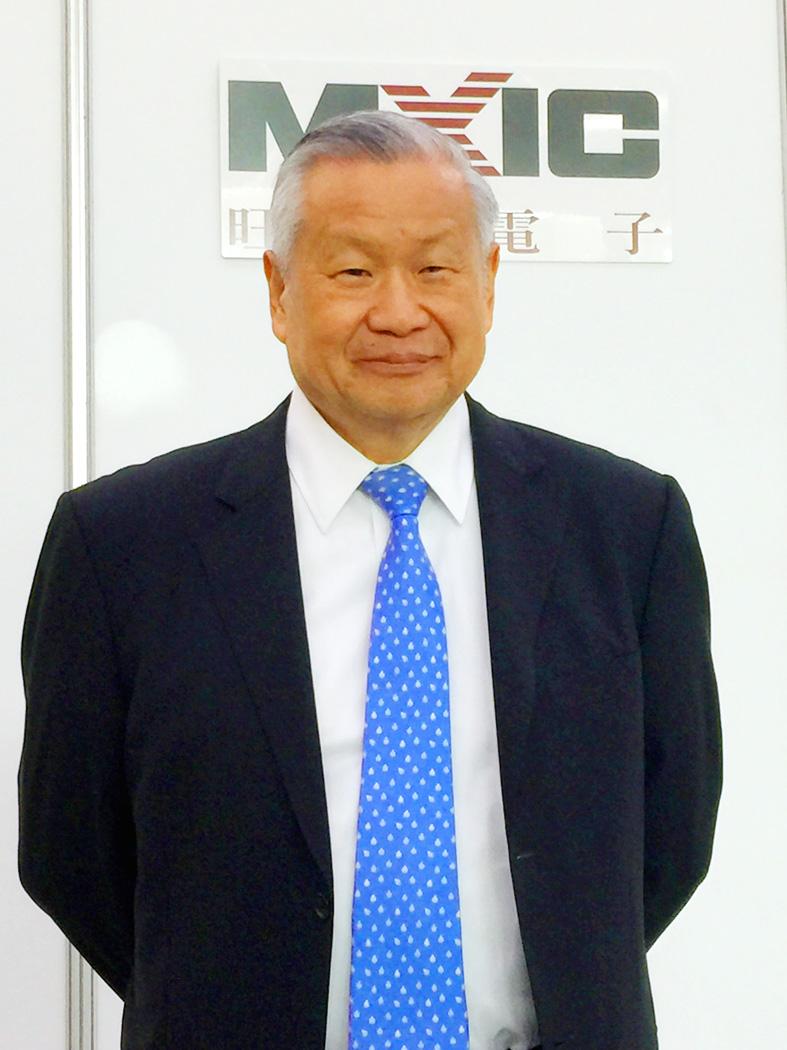Macronix International Co (旺宏), the world’s biggest supplier of NOR flash memory chips, yesterday said that demand is surprisingly strong through next year, with some customers even seeking year-long contracts, as it rejected Morgan Stanley’s bearish view on memory stocks.
The Hsinchu-based company said that the growth momentum is also backed by new orders and new clients amid rising demand for servers, automotive, medical and industrial devices, as well as 5G-related applications, from the US, Europe and Japan.
In addition, Macronix is receiving orders transferred from rivals, whose factories were temporarily shut down due to natural disasters or other factors, it said.

Photo: Grace Hung, Taipei Times
“We are not affected by the uneven supply of components,” Macronix chairman Miin Wu (吳敏求) told investors during an online media briefing. “Our book-to-bill ratio is so high that it surprises us.”
The company’s book-to-bill ratio remained above 1, while revenue has reached new highs over the past 10 months.
Macronix posted record revenue of NT$4.28 billion (US$153.58 million) last month, up 36.4 percent year-on-year.
“Demand for automotive devices has been increasing,” Wu said. “We are seeing some prominent companies, including those from Japan, are turning to Macronix for help, as their suppliers cannot provide any more chips.”
“We are seeing good business through next year,” he said, adding that Macronix has clinched long-term supply agreements at good prices.
Despite the strong revenue growth and rosy prospects, Macronix’s stock has fallen more than 17 percent to NT$37.65 yesterday from NT$45.45 on Aug. 5.
The company blamed the results on Morgan Stanley’s downgrade of its stock to “equal weight” along with other DRAM chipmakers.
In a research note titled “Memory: Winter is coming,” Morgan Stanley analysts cut Macronix’s target price to NT$44 from NT$54.
The researcher warned about a pullback in chip demand, as the industry is entering the late stage of an upcycle.
The price hikes enjoyed by chipmakers are likely to reverse next year, it said.
Macronix said that Morgan Stanley has mistakenly put NOR flash memorychip makers alongside DRAM chipmakers.
DRAM chipmakers might see some weakness due to component supply bottlenecks, but that is not the case for NOR makers, Wu said, adding that the bearish comments were groundless.
The outlook for NOR flash memory chips remains strong in the second half of the year, Wu said.
Automakers are likely to face a new headache with shortages of flash memory chips, he said.
Macronix shareholders yesterday approved a cash dividend distribution of NT$1.2 per common share.
That represents a payout ratio of about 41 percent based on the company’s earnings per share of NT$2.9 last year.

Three experts in the high technology industry have said that US President Donald Trump’s pledge to impose higher tariffs on Taiwanese semiconductors is part of an effort to force Taiwan Semiconductor Manufacturing Co (TSMC, 台積電) to the negotiating table. In a speech to Republicans on Jan. 27, Trump said he intends to impose tariffs on Taiwan to bring chip production to the US. “The incentive is going to be they’re not going to want to pay a 25, 50 or even a 100 percent tax,” he said. Darson Chiu (邱達生), an economics professor at Taichung-based Tunghai University and director-general of

Hon Hai Precision Industry Co (鴻海精密) is reportedly making another pass at Nissan Motor Co, as the Japanese automaker's tie-up with Honda Motor Co falls apart. Nissan shares rose as much as 6 percent after Taiwan’s Central News Agency reported that Hon Hai chairman Young Liu (劉揚偉) instructed former Nissan executive Jun Seki to connect with French carmaker Renault SA, which holds about 36 percent of Nissan’s stock. Hon Hai, the Taiwanese iPhone-maker also known as Foxconn Technology Group (富士康科技集團), was exploring an investment or buyout of Nissan last year, but backed off in December after the Japanese carmaker penned a deal

WASHINGTON POLICY: Tariffs of 10 percent or more and other new costs are tipped to hit shipments of small parcels, cutting export growth by 1.3 percentage points The decision by US President Donald Trump to ban Chinese companies from using a US tariff loophole would hit tens of billions of dollars of trade and reduce China’s economic growth this year, according to new estimates by economists at Nomura Holdings Inc. According to Nomura’s estimates, last year companies such as Shein (希音) and PDD Holdings Inc’s (拼多多控股) Temu shipped US$46 billion of small parcels to the US to take advantage of the rule that allows items with a declared value under US$800 to enter the US tariff-free. Tariffs of 10 percent or more and other new costs would slash such

SENSOR BUSINESS: The Taiwanese company said that a public tender offer would begin on May 7 through its wholly owned subsidiary Yageo Electronics Japan Yageo Corp (國巨), one of the world’s top three suppliers of passive components, yesterday said it is to launch a tender offer to fully acquire Japan’s Shibaura Electronics Co for up to ¥65.57 billion (US$429.37 million), with an aim to expand its sensor business. The tender offer would be a crucial step for the company to expand its sensor business, Yageo said. Shibaura Electronics is the world’s largest supplier of thermistors, with a market share of 13 percent, research conducted in 2022 by the Japanese firm showed. If a deal goes ahead, it would be the second acquisition of a sensor business since